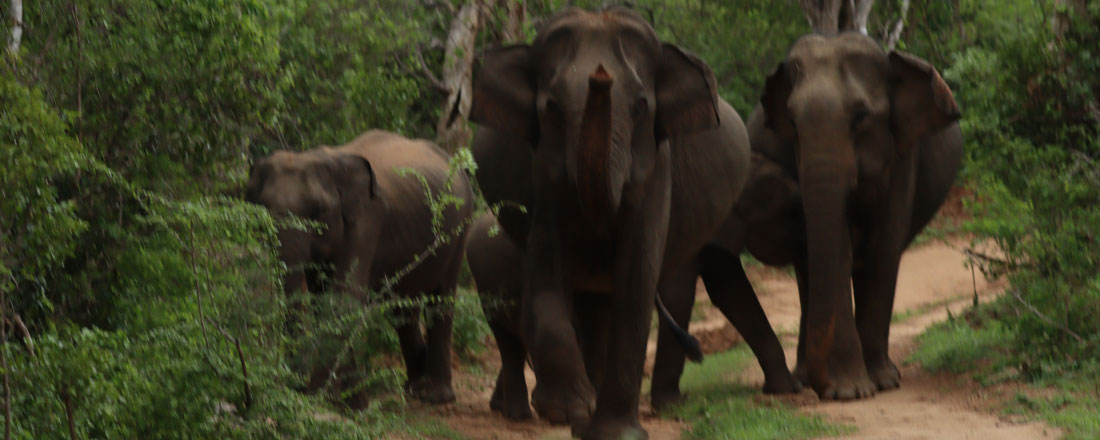News
Govt. ignoring underlying causes worsens human-elephant conflict
View(s):By Kasun Warakapitiya
The government’s failure to scientifically approach the human elephant conflict had complicated existing issues of elephant conservation, environmentalists and state officials said.
They explained that neglect and disregard of already known information as well as overlooking scientific studies, and behaviour of elephants had made things worse, as provincial politicians call the shots.
The resumption of elephant drives and translocations as well as fencing animals inside protected locations have been undertaken by officials. However, environmentalists and wildlife officers say these tactics have been tried and failed.

There's little scientific approach to solving the human elephant conflict, say environmentalists. Pic by Chandani Kirinde
The call to implement the National action Plan for the Mitigation of Human elephant conflict by a appointing a presidential task force, had not been done even though the president had instructed relevant officials to swiftly implement a formal mechanism to resolve the human-elephant conflict, during a discussion Thursday,
Environmentalist and researcher Supun Lahiru Prakash expressed concern over the president’s approach to addressing the human-elephant conflict (HEC), highlighting the superficial nature of recent district coordinating meetings that fail to grasp the complexity and urgency of the issue.
He said that the government’s actions reveal a fundamental lack of understanding of the root causes of HEC, elephant behavioural ecology, and the practical outcomes — successes and failures — of various mitigation strategies.
“The glaring absence of the Ministry of Environment in key decision-making forums concerning elephant management underscores the lack of a logical and science-based approach, despite such principles being central to the government’s stated policies, including those of the National People’s Power (NPP),” Mr Prakash said.
Mr Prakash noted that the absence of the Minister of Environment at the high-level meeting held on the 20th is particularly revealing. More troubling, he added, is that directives to the Department of Wildlife Conservation (DWC) are now being issued by politicians from unrelated ministries. This practice not only undermines the authority of the Environment Ministry, but also raises serious questions about the coherence, credibility, and legitimacy of national-level interventions in wildlife governance.
He criticised elephant drives. “Spending time, money, and manpower on elephant drives is wasteful. Such operations only terrify elephants, leading to heightened aggression when they later encounter humans.”
Another environmental activist Pahiyangala Ananda Sagara Thera explained that the Government had not properly understood the main issues which contribute to the human elephant conflict and had grasped the issue from the wrong end.
He blamed the officials of the Wildlife and Forest Conservation Department for not properly advising the politicians and not informing them of the consequences of unscientific action plans.
According to him, the government’s view that there are too many wild animals, and providing firearms to farmers has led to elephants being shot.
“There are so many tuskers and elephants living with shrapnel in their body, some elephants are deaf, blind while others are disabled due to shooting,” he said.
The Sunday Times learned that no constructive measures have been taken to mitigate the human elephant conflict, and the implementation of policies too have been counter productive.
It was also revealed that over 40% of the positions of field officers authorised to enforce the Flora and Fauna Ordinance remain vacant, while there are more vacancies for administrative staff. This had resulted in high ranking officials handling multiple sections causing a lack of close supervision of each task.
According to a senior state official, the inexperience of top-level decision making and implementation too, had contributed to the present situation.
The official also pointed out that the government’s attempt to create a shadow political network mirroring the state sector has had negative effects as well. Teams have been formed at provincial levels to drive elephants, but these teams do not have the expertise and their actions aggravate issues.
The Director General of the Department of Wildlife Conservation, Ranjan Marasinghe emphasised that it should handle the overall situation, yet had been forced into solving highlighted wildlife issues.
He said there are three elephants with gunshot wounds and shootings of elephants must be prevented.
Mr Marasinghe said that DWC had been criticised on social media by various groups with political agendas, yet the reality is the department’s mandate is to manage wildlife and look into the overall situation by managing a balance.
The best way to say that you found the home of your dreams is by finding it on Hitad.lk. We have listings for apartments for sale or rent in Sri Lanka, no matter what locale you're looking for! Whether you live in Colombo, Galle, Kandy, Matara, Jaffna and more - we've got them all!

